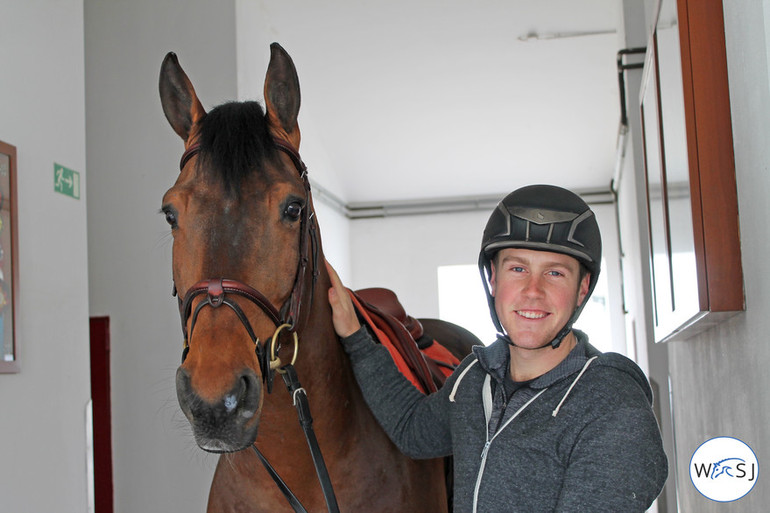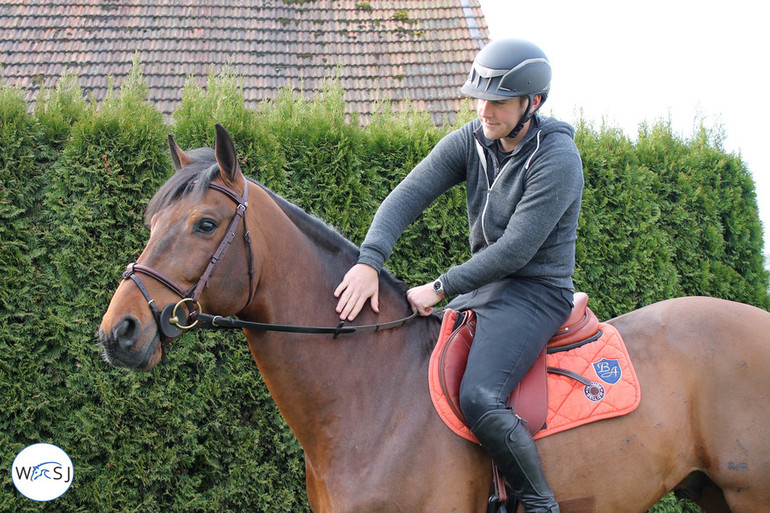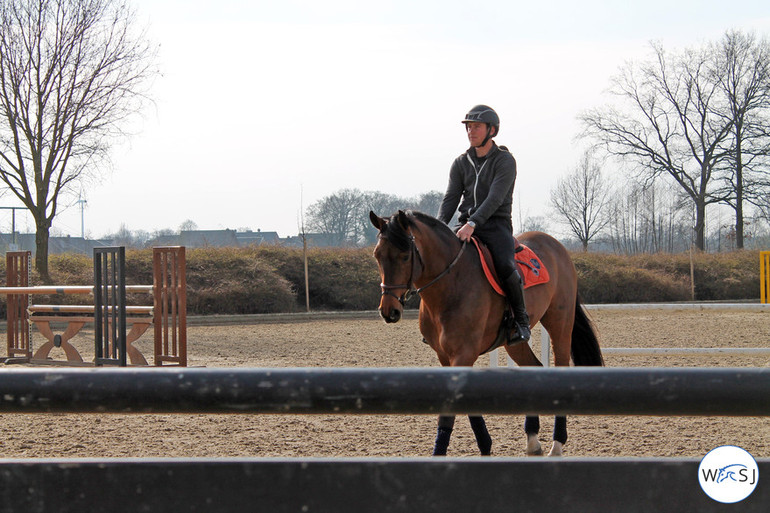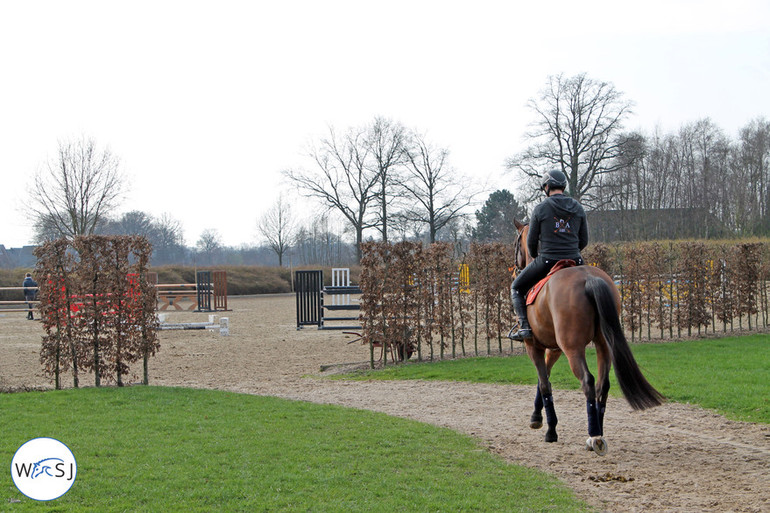When 22-year-old Canadian rider Ben Asselin is not in the saddle, he will watch jumping online. Any type of competition live streamed, You Tube videos of legends, championships from years that passed – you name it – Asselin will be keeping a close eye on it all. We sat down with the young man who since October last year has been based in Riesenbeck, Germany, with legend Ludger Beerbaum and discover a young man who is passionate about the sport and loves the daily work with his horses – or the ‘gentle giants’ – as he calls them.
“At the moment I have a great string of horses and they are all quite German in their type, so I made the decision last summer that the best person to go to learn from would be Ludger Beerbaum,” Ben tells us about how he ended up in Riesenbeck.
“Philipp (Weishaupt) was at Spruce Meadows last spring, and we became good friends – I talked to him about my plans about coming to Europe for a little bit and he actually came up with the idea. Before I knew it I was shipping horses over to Riesenbeck,” Ben laughs.
“I moved over to Riesenbeck in October and have been training with Ludger and his team since then. I think it has been very beneficial for me to see the details in the management and in the training. Ludger is someone I really look up to – he has been so consistent, I think the way he has done it is really something to imitate; having been in the Top 30 in the world for thirty years, and year in year out producing new top horses.”
Asselin has also learned that it is no walk in the park at the top of the sport, and the days in Riesenbeck are long. “We feed at 6.30 in the morning, everybody as a team has breakfast together between seven and eight. I will be on my first horse around 8.00 and then I keep riding until 12.00. We have lunch together as a team and then from 14.00 to 18.00 we ride again. It is long days, but I think the constant contact with the horses and the team atmosphere really adds a lot support between each other,” Ben tells about his life with Team Beerbaum. “My days in Canada are a little bit different – we don’t have as many horses or people as at Ludger’s stable, but we do follow a similar routine through the day.”
Asselin’s grand parents were the founding force behind the Spruce Meadows competition venue in Calgary, Canada so Ben was always surrounded by horses. “I started riding when I was very young, at about 8-years-old. Both my parents were professional showjumping riders as well – my dad represented Canada at the Olympic Games in 2000,” Ben tells us. “I was taught from a young age that you have to work very very hard in order to achieve something. I want to be able to earn my respect in the industry by myself and for people to see that I work hard for what I do. I do feel privileged to be able to ride at this level and to have people who support me in the sport, so the least I can do is to keep my head down, work hard and hopefully see some results in the end. Feed the spirit and starve the ego, is something I try to live by,” Ben tells WoSJ.
At the moment Ben has seven horses to ride. “Cool Feeling and Veyron are the best ones at the moment, and I got a very nice group of 6- and 7-year-olds that I am trying to produce myself. I got a very good team around me – two great grooms in Debbie Buckley and Vicky Thivierge who have been with me for a few years now, and they are with me in Europe. They know the horses really well and take care of them in the best possible way. We also have another great rider, Jenna Thompson, helping to ride and train some of the younger horses. It is a very close knit team – my parents are still very much involved,” Ben says.
Asselin finds that getting into a new system has been interesting. “It is definitely different – the system in Europe, where there is a show every weekend on a short distance, is much better for producing younger horses. There are so many shows. The tough thing in Canada is that we have great shows, but they are spread out across the land so it takes a really long time to get from one to the next. In Europe you drive one or two hours and you are at a new showground. There are very successful riders from both of the systems: However, the nice thing in Europe is that the riders really take their time producing young horses, whereas the Americans mostly go to Europe to find their horses. The discipline in Europe is really something to admire – I think if you can take the best from each system, then you will have a very good program.”
The young talent now aims high. “I have big goals for myself as a rider. I am still young and I got a lot to learn, but I really want to see myself on the Olympic team – I am aiming for Tokyo 2020. I came close last year for Rio with all the trials, and I am very focused on making it to Tokyo,” Ben says. “I will go back home for the summer tour at Spruce Meadows, and after I will make a decision on whether or not I come back to Europe. I really like living in Germany – I like how people are so into the equestrian sports and how big the sport is here. Discipline is something I will take back with me.”
Part of the next generation of showjumpers, Ben wishes to see the sport evolve. “I would really like to see the sport accessible for more people. I think we need to make sure there it stays interesting for the fans, on social media and on TV. I would like to see the sponsors exposed more and to have better marketing – we have a FEI rule about the size of the logo of a sponsor, but these companies are really trying to support the riders and the sport – I think we should give them more exposure,” Ben explains. “I would also like to see that the costs of going to competitions can stay the same. It is already a very expensive sport,” he adds.
When the days are long and you’re far from home, what keeps him motivated? “The first thing you have to enjoy is the horses. I really love the horses; it a joy to work with animals such size, they are such caring and gentle giants. I love the challenge of the top sport – no matter how many hours you spend training; the challenge is always there. I am a very competitive person at heart, but the sport has so many ups and downs so you really have to try and stay consistent – also at the mental level. As soon as you think you are a hero, you go back down to zero. Just put one foot in front of the other,” Ben concludes.
Text and picture © World of Showjumping by Nanna Nieminen (No reproduction without permission)












